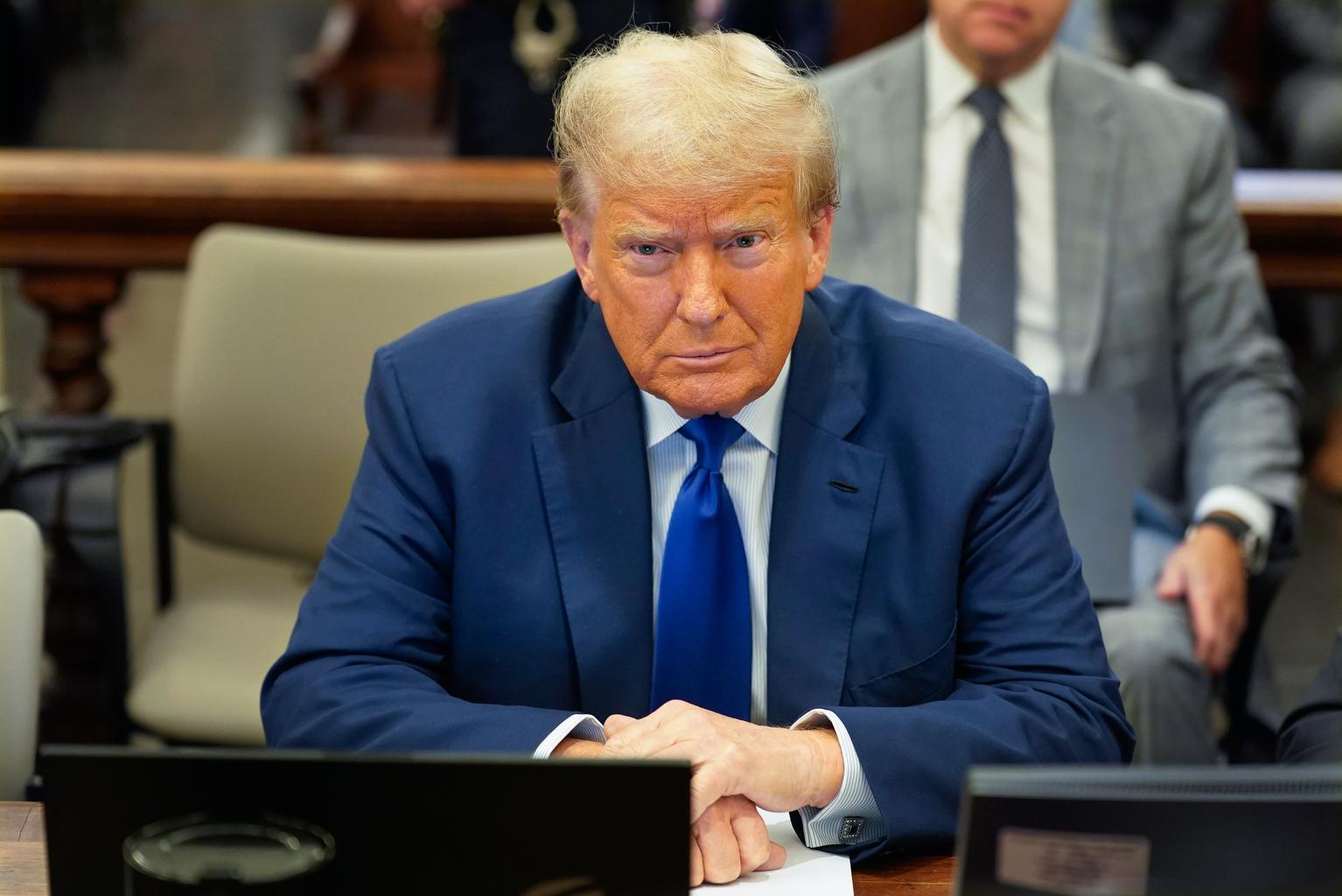
What to know:
- On Wednesday, Nov. 15, both sides presented their final arguments to the judge, who has said she will issue her ruling within 48 hours.
- Friday sees final witnesses before both sides rest their cases. Closing statements will be in person on November 15th.
- On Thursday, Trump's team started to offer their defense, arguing that the president was not involved in an insurrection. Their witnesses include an organizer of the Jan. 6th Stop the Steal rally that preceded the storming of the Capitol, and GOP Rep. Ken Buck, who was in the building that day.
- The plaintiffs' side spent the first three days of the hearing presenting their case. Their witnesses provided first person accounts of Jan. 6 from law enforcement and a congressman, as well as research about far right extremists and constitutional analysis about the 14th Amendment.
- Trial began Monday in Denver District Court on whether former president Donald Trump can appear on Colorado's ballot for the 2024 presidential election.
- A group of Republican and unaffiliated voters have teamed up with a liberal organization to argue that Trump is ineligible to hold office under the 14th Amendment's disqualification clause. His campaign counters that his role in the January 6 riot was limited to constitutionally-protected political speech.
- The hearing is expected to last all week. The judge will issue her written ruling sometime afterwards, but neither side expects the suit to end here; instead it is likely to be appealed, possibly all the way up to the U.S. Supreme Court.
- Editor's Note: If you visit this page multiple times a day, you may need to refresh to see the latest entries.
Wednesday, Nov. 15
Both sides presented their final arguments to the judge Wednesday. Lawyers for the Colorado GOP urged her to consider recent rulings in Michigan and Minnesota, where courts dismissed similar challenges. Attorneys for the Trump campaign and the petitioners focused on the larger question or whether or not the evidence proves the former president engaged in insurrection.
The judge has said she issue her ruling by Friday evening.
Read more of our coverage of the closing statements here.
— Bente Birkeland, CPR News' public affairs reporter
Friday, Nov. 3
4:44 p.m. That’s a wrap - for now
The witness testimony portion of the hearing in the hearing has officially concluded. Closing arguments are planned for Nov. 15th from 3-5pm. Judge Wallace expects to issue her decision on Nov. 17.
Each side will propose findings of fact for Nov. 8th to lay out their arguments.
The judge applauded the decorum the parties exhibited throughout the hearing, saying “I know this case is deeply felt on both sides.” She said they were professional and put on outstanding arguments.
— Bente Birkeland, CPR News' public affairs reporter
2:50 p.m Jan. 6 investigator testifies
Timothy Heaphy, the lead investigator for the House Select Committee on the January 6 Attack, presented his testimony remotely Friday afternoon.
Attorneys for the plaintiffs used their time with him to refute earlier testimony from Trump’s defense. Heaphy said he strongly disputes allegations that the Jan. 6th report — as well as audio and video records of that day — have been doctored in any way. He also disputes the claim that the committee didn’t release interview transcripts publicly or wouldn’t allow certain conservative individuals to testify before it publicly.
He stands by the conclusion that there was an intentional, multi-part plan led by the former President, and facilitated by him and others, to disrupt the joint session of Congress and prevent the transfer of power on January 6th.
When asked if his conclusion was that the former president incited an insurrection, Heaphy said yes, incitement of violence was “one final desperate step” he believes Trump took.
On the cross examination, Trump’s attorney Scott Gessler sought to show that Heaphy prejudged Trump’s role in the riot and that the commission itself had a predetermined bias against the former president.
“That causation was one of the obvious facts that members of the commission and yourself concluded had occurred, even before the Jan. 6th select committee began its investigations, correct?” he asked Heaphy.
Heaphy said it was a hypothesis.
— Bente Birkeland, CPR News' public affairs reporter
11:50 a.m. judge pushes witness on argument that congress should be the entity to interpret the 14th Amendment
Delahunty’s testimony did not conclude before the lunch break. With another witness scheduled to testify remotely starting at 1pm, Delahunty will finish later this afternoon.
At one point, the judge asked Delahunty whether he was suggesting the job of interpreting the 14th Amendment should rest with Congress and not the judiciary.
“Do you have examples of situations in which a court has basically said, ‘the constitution's too hard for me to interpret, therefore I'm going to let Congress tell me what it means?’”
She continued, “I think that's exactly the job of the court, is to interpret the Constitution. And so I’d love to hear from you as to why you think in this instance that what I need to do is say, ‘it's too hard, Congress tell me what it means.’”
Delahunty responded:
“No, I don't have a case law to cite this. Really, it sort of broaches the question whether Section 3 (of the 14th amendment) is self-executing or not. It goes more to that as sort of a prudential or, as I said, constitutionally inflected separation of powers, inflected reason.”
— Bente Birkeland, CPR News' public affairs reporter
10:16 a.m. defense presents their own constitutional expert
Defense is calling its final two witnesses today — first up, retired law professor Robert Delahunty.
He’s here to rebut and offer analysis on earlier expert testimony on the 14th amendment from professor Gerard Magliocca.
The plaintiffs object to Delahunty being considered an expert on Section 3 of the 14th Amendment (the all-important ‘Disqualification Clause’ at the heart of this case), saying that he hasn’t contributed to scholarly work on that subject.
The judge agreed that he’s not an expert on that section of the constitution, but said it doesn’t matter.
“He’s already been endorsed as an expert in constitutional law and the application of historical documents related to constitutional statute and provisions. I’m not sure he needs to be designated as an expert on Section 3 of the 14th Amendment,” she concludes.
Delahunty is a graduate of Harvard Law. He taught philosophy at Derby University in England and at Oxford. He also worked in the office of legal counsel in the U.S. Department of Justice and was a constitutional law professor at the University of St. Thomas.
When asked about Professor Magliocca’s definition of an insurrection, Delahunty said an insurrection as used in Section 3, must be against the constitution of the United states.
“Insurrection is not a freestanding term, it’s coupled with that other phrase, ‘insurrection against the constitution,’ so what really needs to be decided is not the meaning of insurrection but the whole phrase.”
He said the definition is very expensive, unless you limit the scope.
Judge Wallace asked if he was saying that professor Magliocca’s definition of insurrection could apply to a litany of things and he said yes.
They also talk about what it means to engage in an insurrection. Delahunty said he thinks it has a narrow definition. He agreed with Magliocca that the Attorney General’s opinions during the 1860s when Section 3 was being debated shed a lot of light on it.
“I would look (for) guidance, more to the remarks that Jacob Howard makes in introducing the 14th Amendment to the Senate.”
Delahunty said he thinks a good starting point is the idea that this section of the constitution is meant to sanction acts that would destroy the constitution.
He said he’s not aware of any case law or a direct definition of what it means to engage in an insurrection against the constitution. He said it’s a phrase that’s opaque.
“There’s just inadequate guidance as far as I can tell from the relevant sources.”
— Bente Birkeland, CPR News' public affairs reporter
8:30 a.m. final day of hearing
Today will be the last day of testimony and arguments for the hearing. The judge will bring both sides back on Nov. 15th to make their closing statements in person. She has said she'll get her ruling out before Thanksgiving, to give the losing side time to get their appeal in. Everything in this case is working toward the deadline of Jan. 5, 2024, when the state's presidential primary ballot must be certified.
— Megan Verlee, CPR News' public affairs editor
Thursday, Nov. 2
3:00 p.m. Buck cross examination
During Rep. Buck’s cross examination, the plaintiff’s attorney confirmed with him that on more than one occasion he has used the phrase “mob” to refer to the people outside on Jan 6th.
“It is my feeling of what was going on at the time,” said Buck.
Buck was asked whether he believes former President Trump's supporters sometimes act with violence based on his statements.
He said it was a struggle to answer the question.
“I think that if President Trump says ‘it's your duty to vote, you need to go vote,’ I think that his supporters would listen to that and follow those instructions. I think if President Trump says, ‘I want you to go kill somebody,’ I don't think that political supporters being political supporters and not otherwise engaged would go kill somebody,” said Buck. “So I think it depends on what the order is, and I think it depends on the legality of the order, and I think it depends on the context of the order.”
The judge would not allow further questions about Buck’s thoughts on whether the rioters on Jan 6th would have gone home had the president asked them to.
Buck’s cross examination was interrupted when he had to leave to take a Congressional vote. He is now back and wrapping up his testimony.
— Bente Birkeland, CPR News' public affairs reporter
2:22 p.m. Ken Buck on the stand (remotely)
As they built their case that Trump was not involved in an insurrection, his defense team called a perhaps surprising witness Thursday afternoon — Colorado congressman Ken Buck.
Buck, a Republican, voted to certify the election on Jan. 6, and in his retirement announcement yesterday, he excoriated GOP leaders for “lying to America” about the 2020 election.
However, via a remote video link, Buck testified that he believes the findings of the Jan. 6 Select Committee present a one-sided version of that day.“I think that the questions (they asked) were typically questions that would demonstrate President Trump's involvement and culpability in January 6th, or elicit answers that would demonstrate his involvement and culpability in the events of January 6th.”
Buck was inside the Capitol on Jan. 6. In a statement the next day, he called what happened “tyranny and anarchy” but stopped short of blaming the president for the violence.
In his testimony today he elaborated on that.
“I thought what happened on January 6th was obviously bad. It was a riot in the Capitol building. It was meant to disturb a proceeding. And I felt that the parts of the report that I saw described those things,” said Buck., But… ”it went beyond that in other areas, and that's where I think the cross-examination in terms of the president's culpability would have been important.”
This Colorado case hinges not just on whether there was an insurrection on Jan 6th, but Trump’s specific role. Did he engage in the insurrection, and did his words incite an insurrection?
As for whether he felt threatened that day, Buck said at first he didn’t know how serious it was.
He said he was one of the last people to leave the House floor and that he was in a group that officers moved to a committee room for their safety.
The judge asked Buck, when he saw police officers putting up barricades, et cetera, if he could see what was happening out in the hallway, “or are you kind of just in a vacuum at this point in the sense that you see them seeming to prepare for something but don't know what's going on outside the room?”
“Yeah that’s why I mentioned earlier, I felt kind of stupid taking my jacket off and getting ready for a fight because I didn't realize until I got back” how big the crowd was.
“We were moved to a committee room after we were brought off the floor. I had young staff and I was concerned about them. And so I came back to my office rather than the secure committee room, and I saw on TV what was going on and I thought, ‘oh my goodness. There are a lot of people out there.’”
— Bente Birkeland, CPR News' public affairs reporter
10:43 a.m. “Everybody was just there having a good time"
The next witness for the defense is Tom Bjorklund. He’s the treasurer of the Colorado Republican Party, but is not testifying on its behalf, just as an individual who attended the Ellipse rally on Jan. 6.
Bjorklund met up with his brother on the trip and said he was also looking forward to camping as part of it. It was his first ever visit to Washington D.C.
“Everybody was just there having a good time, listening to speeches.”
He says Trump was funny and very entertaining.
He had planned to leave after the rally, but his brother’s friend really wanted to walk to the Capitol building in case Trump gave another speech there. Trump’s team plays Bjorklund’s videos walking on the national mall and to the capitol.
He says when they got there, someone was shouting with a bullhorn asking them to go into the crowd, but he noticed tear gas and thought to himself, “no that’s stupid.” He ended up going the opposite way, toward a line of portable bathrooms.
Near him “a lot of people were in disbelief.” He says many in the crowd around were just standing still, stunned by the events around them.
Bjorklund and other witnesses today were called by Trump’s defense to show that many attendees came to the January 6th rally without any violent intentions, and that even some of those who marched to the Capitol stayed out of fighting and didn’t enter the building.
— Bente Birkeland, CPR News' public affairs reporter
10:05 a.m Congressional staffer testifies about Ellipse rally
Thomas Van Flein, the chief of staff and general counsel for Republican Rep. Paul Gosar of Arizona is now testifying.
He said he attended the Jan. 6 rally at the Ellipse with his wife and the congressman to show support and listen to the speakers. They arrived around 8:30 a.m. and stayed for two hours.
He testified that the crowd was calm and peaceful when he was there and that Trump’s team played a video he took of people chanting “USA” after hearing a speech from Alex Jones.
On cross examination, the attorneys confirmed that he was only aware of what people near him were saying and doing, not the full activity of the crowd.
Some of the testimony appears to veer off the main topic of the lawsuit, such as what Van Flein thinks of the work of the January 6th Select Committee, and whether the election was stolen.
— Bente Birkeland, CPR News' public affairs reporter
10:00 a.m. unauthorized Webex recordings continue to be a concern
Short halt again when the judge admonishes people she said are recording the livestream of the hearing without permission: “It is prohibited under Colorado law.”
— Bente Birkeland, CPR News' public affairs reporter
8:05 a.m. Stop the Steal rally organizer: "There was no insurrection on Jan 6th. There was a riot.”
Judge Wallace is asking both sides if they want to do closing arguments on Friday since she said it appears they’ll have enough time for it. Previously closing arguments were planned for mid-November.
No decision has been made yet.
Trump’s defense will call four witnesses today. Republican Congressman Ken Buck appears to be the final witness of the day.
First up is Amy Kremer, a founder of Women for America First, one of the groups that planned the Jan. 6th rally. Trump’s team is asking her about previous rallies she organized in Washington D.C that were calm and peaceful.
She said the Jan. 6th rally was planned the same way.
“We had two previous rallies, we were going to do the same thing, start at Freedom Plaza and march to the Supreme Court and then wrap it up.”
They ended up switching locations.
“Trump’s campaign reached out and said, ‘would you mind moving your Jan. 6th rally to the Ellipse and possibly having the president speak?’ ‘Of course. Absolutely,’” she said she responded.
Kremer said that location was more secure for the Secret Service and that Trump was safer speaking from there.
She describes the beginning of the day’s Stop the Steal rally and said from her perspective it was fantastic.
“Patriotic, full of love, happy people dancing and just waiting to see their president.”
She added, “These people love President Trump and they couldn’t wait to see him.” She said she was not seeing any anger in the crowd, “not at all.”
“Do you get the feeling that he was telling people to storm the Capitol?” asked one of Trump’s attorneys, Geoffrey Blue.
“Absolutely not. Absolutely not,” she said. “We say ‘fight like hell’ all the time, ‘fight like hell, never back down.’ It’s not physical fighting.”
On cross examination the plaintiffs play a video from the crowd in which attendees are saying, “take the capitol!” Kremer said she hadn’t seen the video before.
She also said she didn’t know who may have been standing outside the metal detectors at the rally or whether they were members of paramilitary groups like the Oath Keepers, Three Percenters and Proud Boys. Plaintiffs lawyers are showing her videos from after the rally, when the crowd swarmed the Capitol.
“Were those people attacking the Capitol patriotic, freedom-loving citizens and happy warriors?”
Kremer said no and agreed that she was aghast at what was happening. She said she watched the storming of the Capitol unfold on T.V. from a hotel with her team.
Later that night, at 6:24 p.m., she tweeted, along with a picture of people storming the Capitol: “I think today signified the end of the Republican Party.”
She said she was referring to the fact the Republican National Committee hadn’t done anything to help with the rally or the stolen election, and wasn’t tweeting about the attack on the capitol. She maintains the attack on the Capitol was not an insurrection, and previously said if people believe that they’re idiots.
“There was no insurrection on Jan 6th. There was a riot.”
— Bente Birkeland, CPR News' public affairs reporter
Wednesday, Nov. 1
5:17 p.m. Trump weighs in
Trump, who is under various gag orders in his court cases around the country, took on the Colorado case on his Truth Social social media platform on Wednesday and described it in Democracy-ending tones.
“A fake trial is currently taking place to try and illegally remove my name from the ballot. I often say that 2024 will be the most important election in the history of our country. The reason for that and that statement is that our country is being destroyed by people who have no idea what they’re doing or even worse, they may very well have an idea. They may hate our country and they may want to see it destroyed,” he said in a measured tone.
He added that the 2024 election “may well be the last election we ever have. If this election doesn’t work. If this election is rigged and stolen, if bad things happen our country will not survive. If crooked Joe and the Democrats get away with removing my name from the ballot then there will never be a free election in America again. We will have become a dictatorship where your president is chosen for you. You will no longer have a vote, or certainly won’t have a meaningful vote.”
— Nicholas Riccardi, Associated Press
5:04 p.m. Congressman Ken Buck on tomorrow’s witness list
Trump’s counsel said they will have four witnesses tomorrow including Colorado’s Republican Congressman Ken Buck, who will testify remotely. Buck made headlines earlier on Wednesday when he announced that he’s not seeking re-election to Colorado’s 4th Congressional District.
In his statement announcing his retirement, Buck excoriated Republican leaders for “lying to America, claiming that the 2020 election was stolen, describing January 6th as an unguided tour of the Capitol and asserting that the ensuing prosecutions are a weaponization of our justice system.”
However, on Thursday he will be testifying in favor of allowing President Trump on Colorado’s ballot next year.
— Bente Birkeland, CPR News' public affairs reporter
3:13 p.m. Unauthorized recording delays hearing
The proceeding is halted briefly when plaintiff’s attorney Eric Olson said he’s been informed that someone has been recording the livestream of the court hearing without permission.
Judge Wallace asks, “And we know that they’re not part of the expanded media coverage?”
Olson said that’s correct. He said it’s a livestream from Ashley Epp. She’s a conservative activist in Colorado who has been very involved in efforts urging people to question — and reject — the results of the 2020 election.
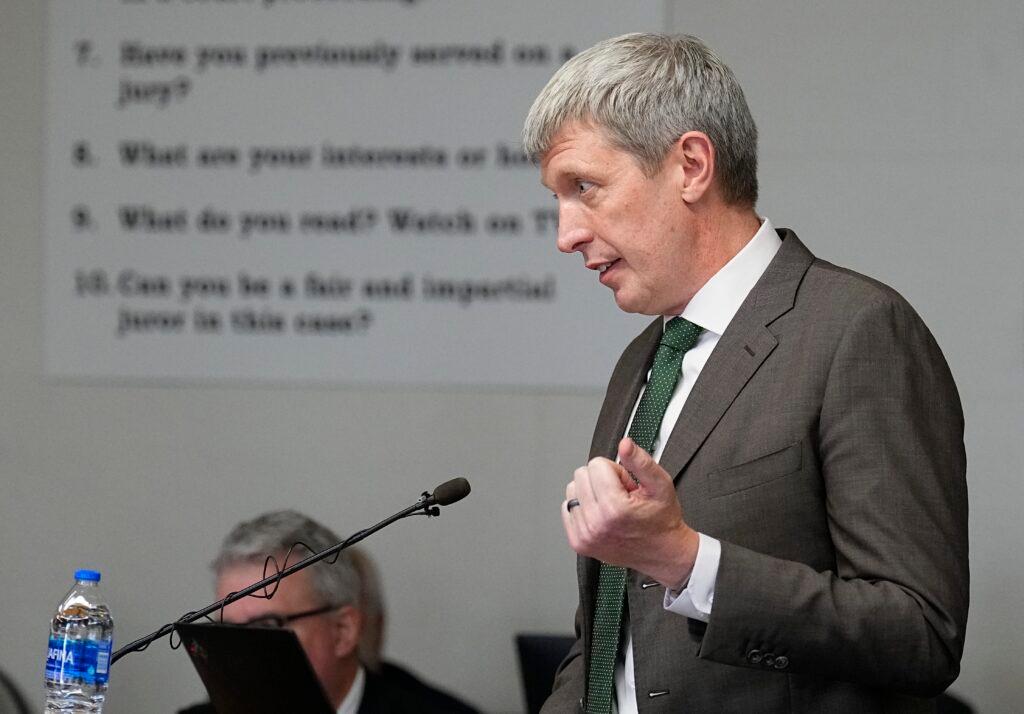
The judge said recording the livestream without permission is a violation of the court’s orders and that “there are very specific statutes and rules in place in the state of Colorado for videotaping proceedings. There is a process and it only applies to actual media outlets.”
The page where the public can watch the livestream includes the warning, “Do not record or reproduce the court proceedings. Any recording of these proceedings—including any audio recording, visual recording, screen capture, or photograph—without the express prior written authorization of the court is prohibited and may subject you to contempt proceedings, including a fine, jail, or both.”
CPR is among a number of media outlets that requested, and were granted permission, to record and broadcast the court proceedings.
— Bente Birkeland, CPR News' public affairs reporter
2:50 p.m. 'We did everything we could'
Kash Patel is testifying for the defense. He was serving as Chief of Staff to the Acting Secretary of Defense when the January 6th riots occurred. He’s currently a paid senior advisor to President Trump on national security and defense policy issues.
He said the Department of Defense had authorization from Trump to use the National Guard on January 6th. But said other local authorizations from the capitol police and the Washington D.C mayor also needed to be in place.
“Absent those requests, we were under the advisement of our legal counsel's offices that we could not activate the National Guard. We did everything we could up to the legal limit to try to begin the processes of getting these folks ready.”
Patel’s testimony is pushing back against claims from plaintiffs that Trump did not do enough on January 6th to stop the violence. Patel said the President alone is just one piece of things.
“So while we always wish to have done it faster, the timeline in which we did it was pretty amazing given what the men and women had to do on the ground.”
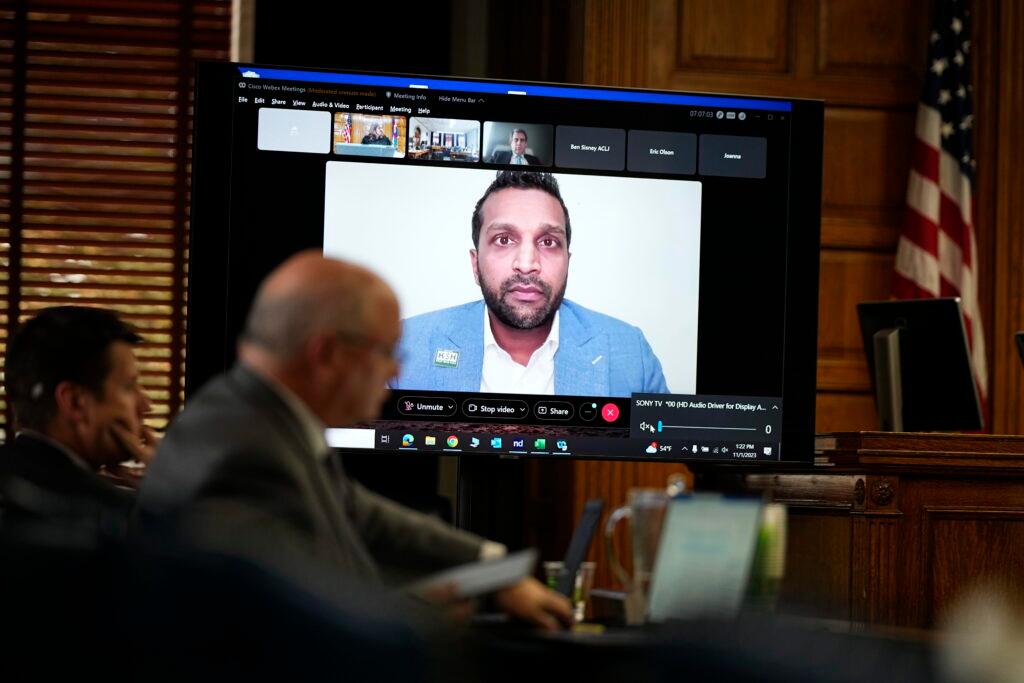
The cross-examination from attorney Jason Murray was definitely the most lively/contentious of the hearing so far.
At one point Murray pressed Patel on whether he thinks all liberals or liberal leadership are evil. Patel called the assertion ridiculous.
Murray then played an interview Patel had done about Democratic leaders.
“The leadership is evil. They're not stupid. There's a distinction. I've worked with all of these people. They are pure evil. The only thing the Pelosis and the Schumers care about in the world is being glorified in the media. That's it.”
Patel said he was talking about specific people in power, not all liberals.
Editor's Note: This entry originally misspelled Kash Patel's name. It has been corrected.
— Bente Birkeland, CPR News' public affairs reporter
1:45 p.m. No directed verdict
After lunch, Judge Wallace dismissed the defense's motion to reach a verdict on the case. One of the attorneys for the Secretary of State’s office said that motion is not in line with the rules for this type of proceeding.
That means we’re moving forward with the defense’s case and witnesses for the rest of the week.
— Bente Birkeland, CPR News' public affairs reporter
1:28 p.m. New defense effort to end case early
The defense has asked for a directed verdict, which is when a judge issues a ruling after the plaintiffs present all of their evidence, concluding they essentially failed to make their case. Trump’s team is arguing that’s warranted because there’s no legally sufficient basis for the lawsuit.
Trump’s attorney Scott Gessler, a Republican and former Colorado Secretary of State, said absolutely nothing the former president said prior to Jan. 6th amounts to incitement. Gessler said all of the evidence presented by the plaintiffs boils down to trying to condemn Trump for things he said — “it’s all speech and well established in First Amendment principles.”
He said nothing in the Ellipse speech on Jan. 6 was a call to violence, but instead fell within the boundaries of normal political rhetoric. “There’s no way when he said we need you to fight for the country, we need to march down to the capitol (that) that’s incitement.”
Gessler said that Trump emphasized going to the Capitol patriotically, and peacefully.
“He created a common sense of purpose as the penultimate end of the speech,” said Gessler, arguing it negates any violent intent. “There was no call to violence. “‘Fight’ is a common political metaphor, meaning a political fight.”
— Bente Birkeland, CPR News' public affairs reporter
1:03 p.m. State official walks through the process for candidates to get on Colorado's ballot
The hearing has moved on to the nitty gritty of getting on the ballot in Colorado. Deputy Colorado Secretary of State Hilary Rudy is testifying on the various forms that candidates must file to run for office and the process for the state to evaluate the information and make a determination about whether a candidate qualifies for the ballot.
Rudy testified that there hasn’t been an instance in which a presidential primary candidate has completed the paperwork and the Secretary of State’s office has then disqualified that candidate, underlining how much this case puts the state in new territory.
The certification deadline for candidates for the Colorado primary ballot is January 5th, 2024.
— Bente Birkeland, CPR News' public affairs reporter
12:14 p.m. Constitutional expert breaks down Section 3, known as the "disqualification clause"
Tuesday’s hearing began with the plaintiff’s final expert witness, constitutional law professor Gerard Magliocca from Indiana University. He’ll be discussing the history of Section 3 of the 14th Amendment, known as the "disqualification clause."
He said he tries to look at primary sources when analyzing the history of amendments, such as presidential documents, congressional reports, newspapers, and contemporary books — basically, any kind of source that offers a first-hand account of what happened during a certain time period.
Magliocca explains the post-Civil War context for the inclusion of Section 3 in the 14th Amendment.
“In 1865, after the war ended, many of the same people who had been in office before the war and had left to join the Confederacy were returned to office. And some of them showed up to the new Congress and essentially said, ‘Okay, we're here to take our seats now,’ as if nothing had happened. And congressional Republicans were very upset at this idea. They felt that this was wrong,” said Magliocca.
He said there’s been limited use and data regarding the applications of the disqualification clause. However, he noted that two notable insurrections occurred in the 1770s in Pennsylvania when farmers took up arms to protest against new federal taxes.
He said at the time they were referred to as insurrections in legal documents and presidential records. “There was no actual violence. There's no record of anybody being killed. And again, we were talking about hundreds of armed farmers who were sort of behind the sort of resistance to this tax.”
Magliocca said the historic record for the clause also includes judicial opinions and writings from U.S. Attorney General Henry Stanbery, who in 1867 was tasked with interpreting the military reconstruction acts of Congress.
“Insurrection was understood broadly to include any voluntary act in furtherance of an insurrection against the Constitution, including words of incitement.”
That could be a key point for this case, as plaintiffs argue that Trump’s words on Jan. 6 and earlier were instrumental in prompting the violent attack on the U.S. Capitol.
In his testimony, Magliocca noted that Section 3 applies specifically to those who have previously sworn an oath to the constitution, who at the time the amendment was ratified were deemed most responsible for secession and the Civil War.
Even though the office of president and vice president are not specifically mentioned among the offices listed in the clause he said it’s clear they still apply.
“In the sense that it would've been odd to say that people who had broken their oath to the Constitution by engaging in insurrection were ineligible to every office in the land except the highest one.”
Later today the defendants will put forward their first witnesses, and they have a legal expert to also discuss the application of the 14th Amendment.
— Bente Birkeland, CPR News' public affairs reporter
Tuesday, Oct. 31
4:52 p.m. After discussion of Trump's powers to stop Jan. 6, court ends early in deference to trick-or-treating
The final witness of the day from the plaintiffs is William Banks, a constitutional and national security law professor at Syracuse University College of Law. He’s also a founding director of the Institute for National Security and Counterterrorism.
Banks said former president Trump had plenty of authority to respond forcefully to the Jan. 6th attack when it was clear that the protest had turned violent, but did not exercise it.
“I believe around 1:34 p.m. the mayor (of Washington D.C) and chief of police asked for more support, so there were at least two calls before 2pm that should have alerted the president to what he was already seeing on TV — that there was an attack at the Capitol.”
Banks noted that in the summer of 2020, Trump deployed the National Guard to control protests in Washington after the death of George Floyd.
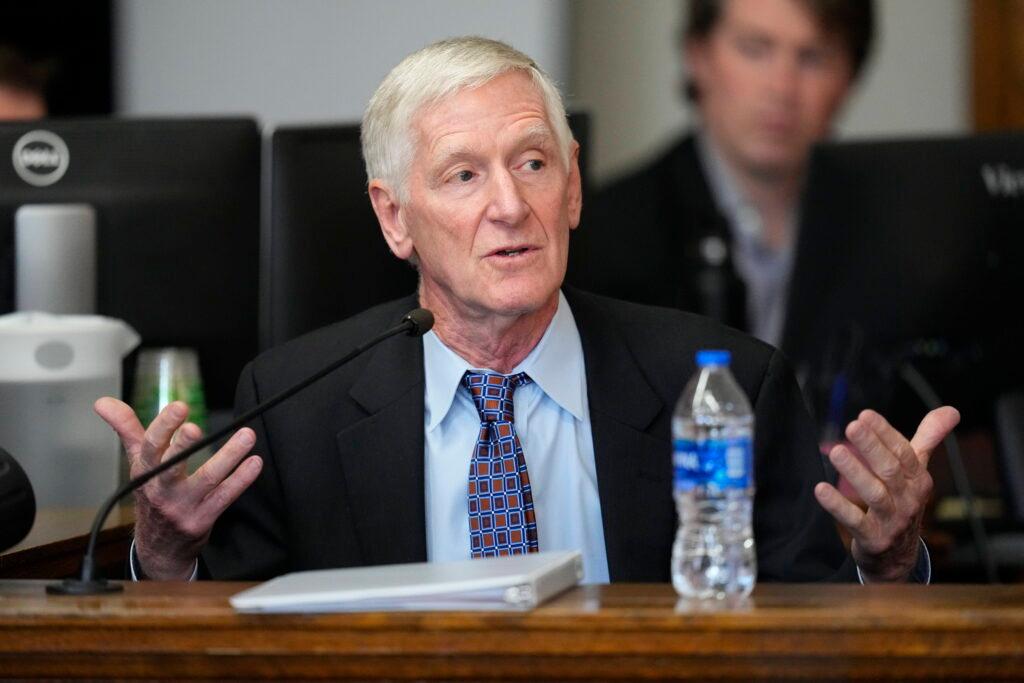
Trump’s attorney got Banks to clarify that he wasn’t saying Trump should have had the National Guard ready on January 5th, the day prior to the riot.
But Banks said Trump should have acted swiftly that day when violence was occuring.
“He should respond to his constitutional responsibilities to protect the national security of the United States when there's an assault on our democratic process.”
He also said Trump could have declared a state of emergency.
Trump’s attorneys asked if he was aware of a president declaring a national emergency within two or three hours of a riot starting. Banks responded with several examples: “Little Rock 1950s. Birmingham, early 1960s. Los Angeles, 1984.”
The last witness's testimony was relatively short and the judge adjourned early at 3:38 p.m.
“For all of you with young kids, I’m sure you’ll be happy to hear we’re going to recess,” said Judge Wallace.
When she scheduled the hearing and realized part of it would fall on Halloween, the judge made it clear that she would make it an early day. Even though she doesn’t have young children at home, Wallace said she’s big on passing out candy in her neighborhood.
The hearing continues at 8 a.m. tomorrow and we expect to hear expert testimony on constitutional law and the 14th Amendment. It’ll also be the first chance to hear expert testimony from defense witnesses.
— Bente Birkeland, CPR News' public affairs reporter
2:54 p.m Is “1776” coded language? Professor on political extremism weighs in
The cross-examination of professor Simi continued after lunch. There were some technical issues earlier and Gessler couldn’t find all of the videos he wanted to play. He was able to play the clips when the hearing resumed. Yesterday he told members of the media the compressed timeline of this case has made it difficult for his side to fully prepare.
“They spent 10 months getting ready for this case. And then we've got several weeks, and I've expressed my frustration multiple times to the judge,” Gessler said.
Colorado’s primary ballot must be certified by Jan. 5, 2024, giving the case a hard deadline to work its way through the court system.
The day has been spent entirely with Simi on the witness stand, examining far-right extremist speech and whether Trump used both coded and direct language to incite violence from the far-right elements of his base.
Gessler asked whether the phrase “1776” counted as coded language. “If I'm not part of the far right I won’t view the 1776 statement as a call to action, but if I am…I will learn that it’s a coded call to violence?”
Simi answered in the affirmative.
They also went back over the speech Trump made at the Ellipse on Jan. 6. Simi said in earlier testimony that the speech has contextual cues that hinted at violence, with only one overt reference to marching peacefully to the capitol.
“For far-right extremists, there would be a clear understanding that fighting is the real message, not being peaceful,” Simi said in his earlier testimony.
Judge Wallace broke in during that testimony to question his assumption.
“Is it your testimony that if you had watched that speech and nothing had happened, that you would have the same view? I mean, I guess what worries me with all of this is it's all kind of in 2020 hindsight,” said the judge.
Simi said his interpretation of the speech is independent of what happened at the Capitol in the following hours.
“I was already concerned, certainly, about the precursors to January 6th and that speech in real-time, given the language, the reference, the amount of emphasis on fighting, that would've given me very, very substantial concern that violence would be soon to follow,” he said.
— Bente Birkeland, CPR News' public affairs reporter
11:11 a.m. Extremist expert draws connections between Trump and far right
Simi spent the morning going over specific tweets and interviews that Trump delivered leading up to Jan. 6th and arguing there is a shared language between Trump and far right extremists.
He said far right extremists were galvanized, energized and mobilized by Trump’s call for them to be there on Jan. 6th, especially his now-infamous tweet urging “Be there, will be wild!”
Simi said Trump framed the stolen election as an existential threat that needed to be fended off, and required his supporters to act in their own self defense.
“The existential threat was to no longer have Donald Trump in power and having that taken away from them… but also more broad than that, that our country is on the verge of being taken away from us.”
He said this idea of theft and having things stolen is consistent with a broader world view that far right extremists tend to have.
The petitioners are making the case that the lead up to Jan. 6th was the confluence of Trump, the Big Lie of a stolen election and preceding episodes of extremist violence.
“I’ve never seen anything in recent history like this,” Simi said of Trump’s language that he believes encouraged and inspired people to engage in violence.
Trump’s attorneys started their cross examination of Simi just before lunch, opening with questions about whether any of the extremists who participated in his research over the years were involved in Jan. 6th. Simi says the answer is complicated, but he doesn’t believe any of them were.
Trump’s lead attorney Scott Gessler said yesterday that his side will show Trump did not call for violence.
“Nothing has ever asked for violence, nothing has ever urged anything remotely close to an insurrection. He's asked people to behave patriotically, peacefully, respect law enforcement. He said ‘peace’ multiple times on January 6th,” said Gessler. “Stuff that any politician or any president would be proud to say.”
— Bente Birkeland, CPR News' public affairs reporter
8:55 a.m. Trump’s lawyers will call Texas Congressman
While the team representing the former president hasn’t made their list of witnesses public yet, one witness announced himself on Tuesday.
Texas Congressman Troy Nehls tweeted that he’s “honored” to be called to testify at the hearing later this week:
?BREAKING: I'm honored to announce I will be serving as a fact witness for President Trump's defense in the 14th Amendment removal sham trial in Colorado.
— Congressman Troy E. Nehls (@RepTroyNehls) October 31, 2023
I was at the doors on January 6, face to face with protestors, and I know firsthand there was NO INSURRECTION.
This sham…
Nehls is a former sheriff and a veteran of the Army Reserve who deployed to Iraq and Afghanistan. He had just been sworn in for his first term in Congress three days before the Capitol was attacked on Jan. 6, 2021.
In the House, he serves on the Judiciary and Transportation and Infrastructure committees.
— Megan Verlee, CPR News' public affairs editor
8:44 a.m. Second day underway
The second day of the hearing that could disqualify President Trump from Colorado’s ballot begins. It will include expert witnesses from the petitioners. There aren’t as many people in the courtroom today.
The hearing opens with testimony from Chapman University Professor Peter Simi He said he’s been studying issues around political violence and political extremism for his entire career and starts out by giving a lot of detail on his credentials. Simi testified in the past in the trial of organizers of the 2017 Unite the Right rally in Charlottesville, VA.
He said he’s interviewed 217 right-wing extremists, including members of the Oathkeepers, Proud Boys, and Three Percenters. He’s going over the origins and beliefs of those three groups.
— Bente Birkeland, CPR News' public affairs reporter
Monday, Oct. 30
6:40 p.m. Wrapped up for the day
On Tuesday, the petitioners are expected to introduce several expert witnesses, starting with an expert on extremism, followed by specialists on constitutional law.
Trump’s team is also scheduled to present their arguments on Wednesday. One of Trump’s attorneys in the case, Scott Gessler, said he expects his side to present about nine witnesses. He said the court asked that he not reveal their names in advance, out of safety concerns.
After the court adjourned for the evening, Gessler reflected on the first day of the hearing.
“They don't prove much of anything except they dislike him,” said Gessler of the plaintiffs’ evidence against Trump. “That's really what they've proved. The best they have is trying to be a Mini Me January 6th report. That's the best. They've got sort of a pretty slick movie production they've entered into evidence and things like that, and that's not real evidence. That's a partisan witch hunt.”
— Bente Birkeland, CPR News' public affairs reporter
4:32 p.m. Trump's own words
The hearing resumed after a short break. Trump’s team said they now have an expert in communications slated to testify later this week. The plaintiffs were concerned that their own expert, who is testifying first, wouldn’t then be able to rebut the Trump witness testimony on the stand, but the judge said she would make sure they had time for rebuttal at a later date.
Plaintiffs are playing more videos in the court of the violence that occurred on January 6th after Capitol security was breached.
They also introduced evidence from Trump’s impeachment trial, when one of his impeachment attorneys, Michael van der Veen, said, “The question before us is not whether there was a violent insurrection of the Capitol. On that point, everyone agrees.”
The plaintiffs show another video from the Jan. 6 Select Committee, this one of rioters chanting “Nancy! Nancy! Nancy!” They repeat some of the committee’s findings, including that more than 140 Capitol police were injured and more than 2,000 people gained access to the interior of the Capitol building, and that then-Vice President Pence and his family were at risk.
Trump’s attorney said they object to the characterization of what happened on Jan. 6 as an insurrection. The judge responded that the court allowing evidence to be introduced is different from the court drawing a conclusion.
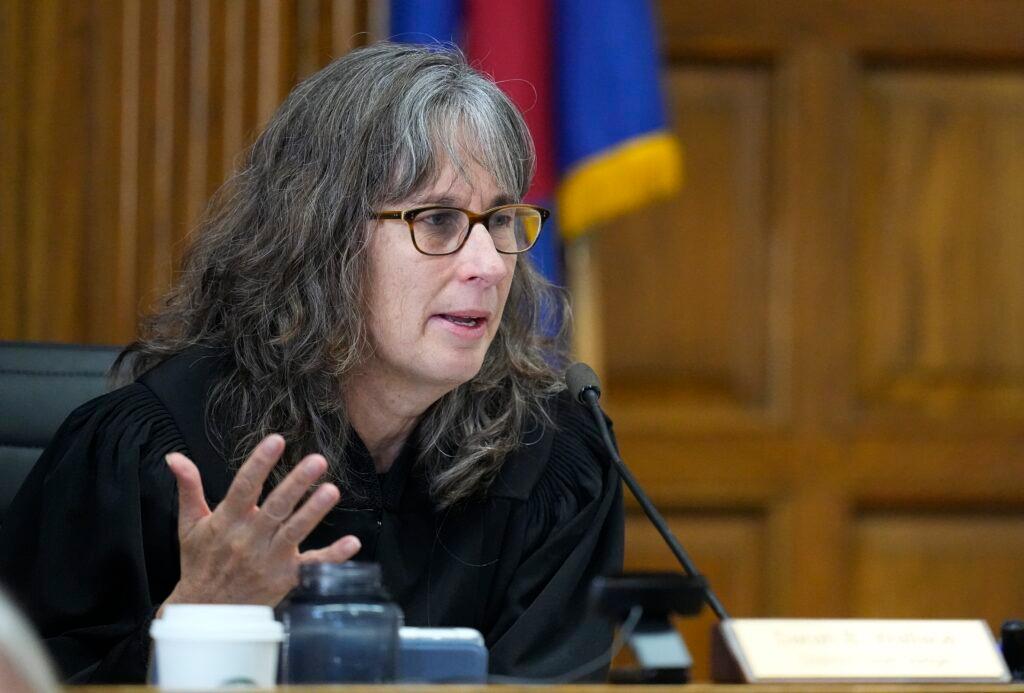
“Just because I allow it in the January 6th report,” she said, “doesn’t mean I agree with all of the findings.”
Plaintiffs are next trying to show evidence that Trump personally engaged in an insurrection with the goal of overturning Biden’s victory.
They played a clip of Trump from election night, declaring, “This is a fraud on the American public. This is an embarrassment to the country. We were getting ready to win this election. Frankly, we did win this election.”
The plaintiffs followed up with a number of Trump’s tweets and interviews from after Election Day and before the riot, in which he called the election rigged and said it was statistically impossible that he lost, as well as video from his speech on the Ellipse on Jan. 6 before the crowd moved to the Capitol.
“I hope Mike Pence is going to do the right thing. I hope so because if Mike Pence does the right thing, we win the election,” Trump told the rally.
“You’re stronger, you’re smarter, you’ve got more going than anybody and they try to demean anybody doing anything with us.”
“You’ll never take back our country with weakness.” He then told the crowd he wanted them to patriotically and peacefully make their voices heard.
— Bente Birkeland, CPR News' public affairs reporter
3:08 p.m. Swalwell cross-examined
In their cross-examination of Swalwell, Trump’s attorneys highlighted a separate lawsuit the Democratic congressman filed against Trump and some of his associates in the U.S. District Court for the District of Columbia. That suit asks whether Trump is entitled to absolute presidential immunity from liability for allegedly inciting a riot at the U.S. Capitol.
Trump’s attorney said if the Colorado lawsuit is successful it would bolster Swalwell’s other case.
He also pointed to Swalwell’s own tweets that ask people to “fight” for various causes and said politicians often use expressions like “fight like hell” in statements and speeches as a form of political speech not an actual call for physical violence.
— Bente Birkeland, CPR News' public affairs reporter
2:50 p.m. A California congressman testifies
The second witness, Democratic Congressman Eric Swalwell of California gave his testimony remotely about the events that occurred on Jan 6th. Swalwell was the Speaker Designate that day in the U.S. Congress and was presiding over the chamber during the election certification process.
He recounted how the security officers started to give the members instructions at the podium as things were escalating.
“I didn’t know that there were gas masks under our seats. I think people were surprised that they were even there,” said Swalwell, noting that he had no idea how to use his.
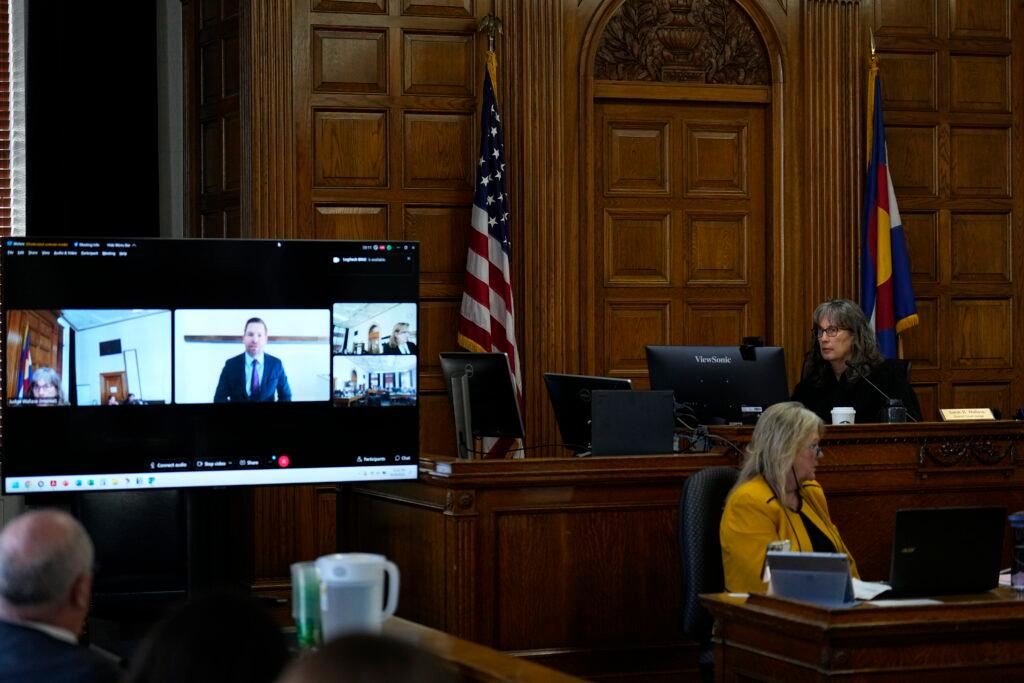
He said members were reading Trump’s tweets as events unfolded.
“We connected the president's tweets to our own safety in the chamber and also to the integrity of the proceedings.”
There was an audio/visual tech issue with Swalwell’s remote testimony and the court adjourned for lunch to get it sorted out. When we returned, his testimony continued.
— Bente Birkeland, CPR News' public affairs reporter
10:35 a.m. First witness
Now up, the first witness to testify — Washington D.C. police officer Daniel Hodges.
Hodges was part of the civil disturbance unit and was called to the U.S. Capitol around 1:30 pm. on January 6th to help defend the building.
He said he can’t remember all of the different ways in which he was assaulted that day: “punching, kicking, pushing, chemical irritants, beaten in the head with blunt instruments, including a baton, crushed with a shield.”
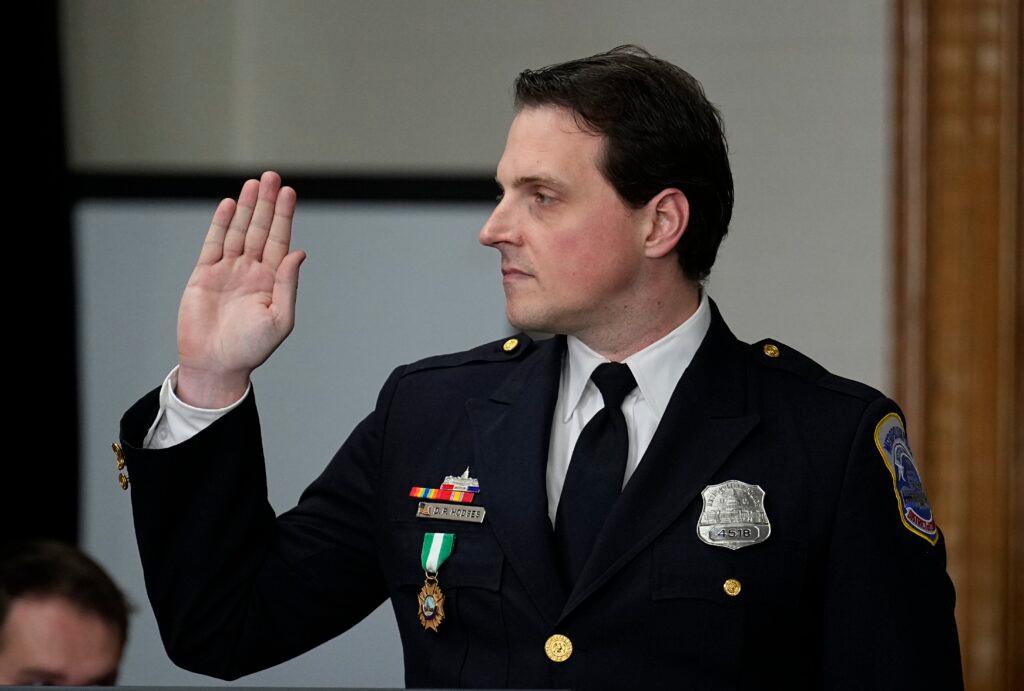
Hodges said he was afraid for his life, for his colleagues, and for the people inside the United States capitol, including Vice-President Mike Pence. He also worried about what it would all mean for democracy.
“I saw people carrying banners saying ‘Stop the Steal’ I heard them chant ‘Fight for Trump’ and carrying various flags referencing war and revolution and said we were traitors and on the wrong side of history,” said Hodges.
He said the sheer size of the mob was the most effective weapon it had on that day. “They had us completely outnumbered, had us encircled.”
Footage from Hodge’s body cam has also been admitted as evidence.
— Bente Birkeland, CPR News' public affairs reporter
10:32 a.m. Opening statements for the defense
Scott Gessler, who served as Colorado’s Secretary of State from 2011 to 2015, gave opening arguments in defense of former president Trump.
“This lawsuit is anti-Democratic,” asserted Gessler. He said it seeks to extinguish the opportunity of millions of Coloradans to be able to vote for the candidate they want, the leading GOP candidate.
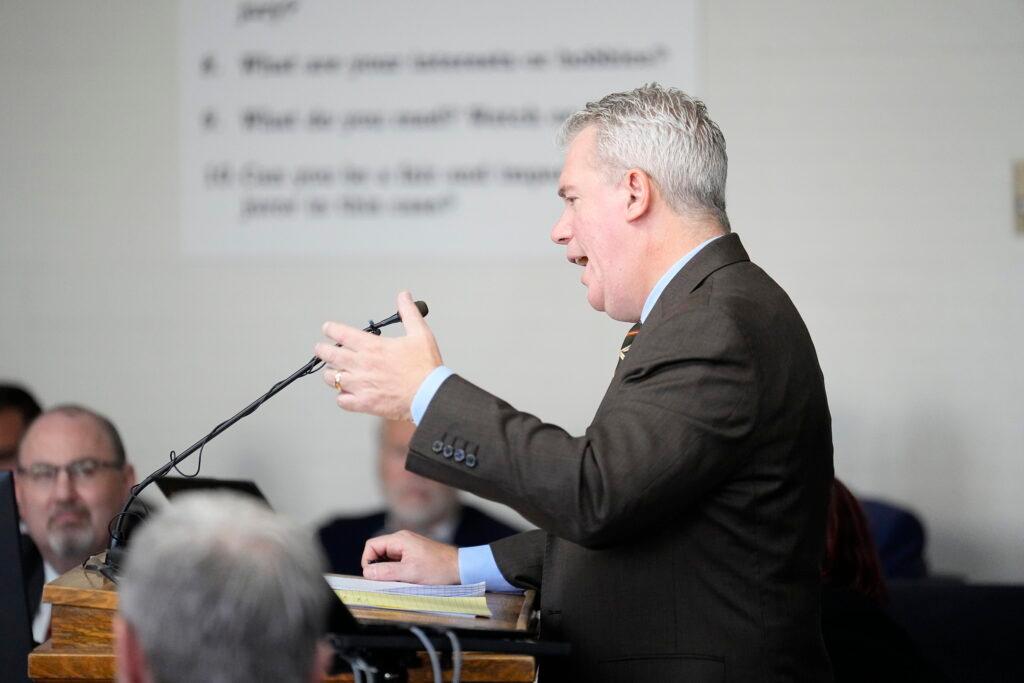
Gessler will argue that Trump’s behavior doesn’t meet the requirements of the disqualification clause, which bars people who’ve engaged in insurrection from holding office.
“The term ‘engaged’ means to do something,” said Gessler. “It doesn’t mean mere incitement with words.”
He said at its basic level this lawsuit is election interference.
“We shouldn’t even be here,” Gessler told the judge. He said this is a federal issue and it must be left up to Congress to set standards and provide guidance on how to apply this part of the Constitution.
— Bente Birkeland, CPR News' public affairs reporter
10:24 a.m. Opening statements for the plaintiffs
Attorneys for the plaintiffs are going through their opening arguments, which include a lot of tweets and videos from January 6th. They also plan to call up three people who were there that day to testify, including Washington D.C. police officer Daniel Hodges and Democratic Rep. Eric Swalwell of California.
Hodges, who was injured trying to keep rioters from breaching the Capitol, has testified in the criminal case against one of the January 6th participants, as well as telling his story to the January 6th committee.
Swalwell served as an impeachment manager for Trump’s second impeachment and also filed his own lawsuit against the former president and his allies for inciting violence at the Capitol.
Peter Simi, an associate professor in the Department of Sociology at Chapman University, and an expert in political extremism, will also take the stand.
Attorney Eric Olson said of Trump, “he made repeated deliberate statements to bring a mob primed for violence.”
Olson said after inciting and organizing the mob, the former president helped them by refusing to mobilize resources to stop the attack. “He watched for three hours on T.V. before doing a single thing even though he was the most powerful person in the world.”
— Bente Birkeland, CPR News' public affairs reporter
10:08 a.m. Getting underway
As the first day of the hearing was getting started, Judge Wallace joked about the packed courtroom: “I think we have more lawyers and police officers than anybody else.”
— Bente Birkeland, CPR News' public affairs reporter
9:45 a.m. Trump campaign speaks with reporters
The Trump campaign met with reporters outside the courtroom just before the start of the hearing. Jason Miller with the Trump campaign said Democrats have made the determination they cannot beat the former president at the ballot box, so they’re trying to do it through the courts.
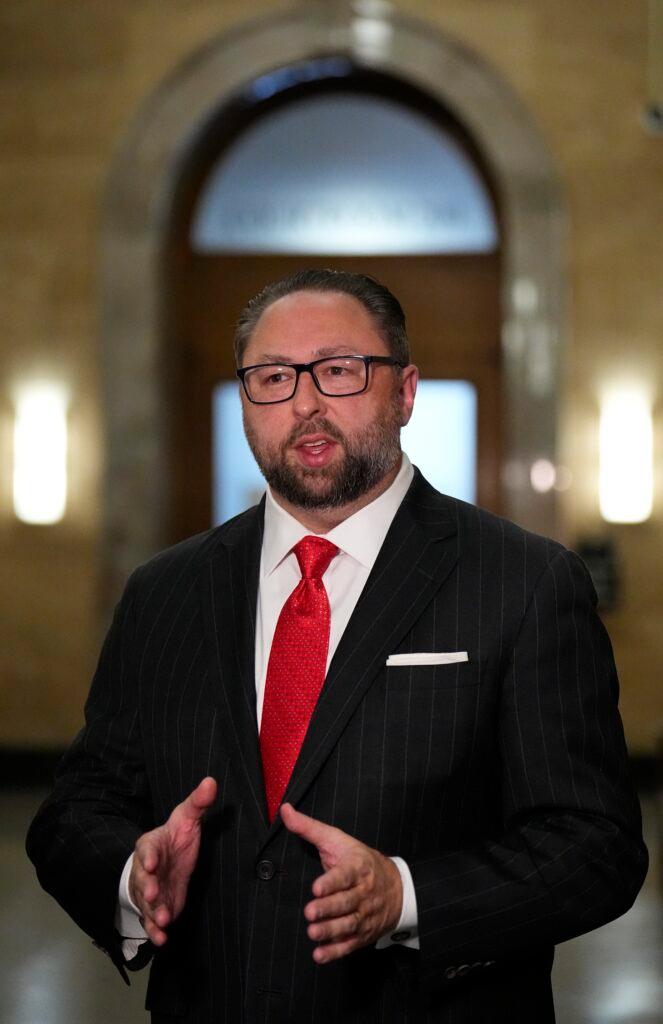
“We're here with a courtroom behind us because they're trying to put up their “steal curtain’ around Colorado,” said Miller. “The Democrats are trying to steal this race. There is no other reason for us to be here. This is un-American. This is election interference. Everybody sees what's going on. We all know the reason why this is happening is because President Trump is only a couple of points behind Joe Biden here in Colorado.”
The latest polls show Biden leading Trump by a margin of 4 to 10 points in Colorado.
Miller added that Trump’s attorneys filed a motion for recusal for Judge Sarah B. Wallace on Saturday, based on her perceived politics.
“Judge Wallace just a year ago donated to the Colorado Turnout Project… a lefty group with this single goal of keeping Republicans off the ballot. How the hell do you get a fair hearing or failed trial with a judge who's donated to the Colorado Turnout Project?”
The Colorado Turnout Project’s stated goal is to elect Democrats in Colorado, with a specific focus on unseating GOP congresswoman Lauren Boebert.
However, at the start of the day’s hearing, Judge Wallace denied the motion for recusal. She didn’t dispute that she apparently made a $100 contribution to the PAC but said prior to this weekend, she wasn’t aware of the organization or its mission.
“I have no specific memory of this donation.”
— Bente Birkeland, CPR News' public affairs reporter
8:14 a.m. at the courthouse
The first day of the hearing in the 14th Amendment lawsuit against former president Trump started quietly. Most benches in the Denver District courtroom were filled with journalists, many of whom had waited close to an hour in the bitter, predawn cold to be assured a seat.
There were also plenty of lawyers, all preparing to argue a case that could shape the direction of the 2024 presidential race.
The judge said she plans to run the hearing every day this week from 8 a.m. to around 5:30 p.m., or later if they have to — although she’ll end a bit earlier tomorrow for Halloween (participants with small children will appreciate that exception.)
— Bente Birkeland, CPR News' public affairs reporter
4 a.m. Trial starts today
Journalists and political watchers are expected to pack a Denver courtroom this morning for the kickoff in a weeklong hearing over whether former president Donald Trump can appear on Colorado's Republican primary ballot next year. Groups have launched similar challenges against his candidacy in other states, arguing that his post-election actions rose to the level of 'insurrection' and should disqualify him from ever holding office again, but this case is the furthest along.
CPR public affairs reporter Bente Birkeland will be in the courtroom as the hearing gets underway and reporting back the main claims laid out by each side, as they argue a case with the potential to reshape the 2024 presidential election, and the national political landscape.
— Megan Verlee, CPR News' public affairs editor








